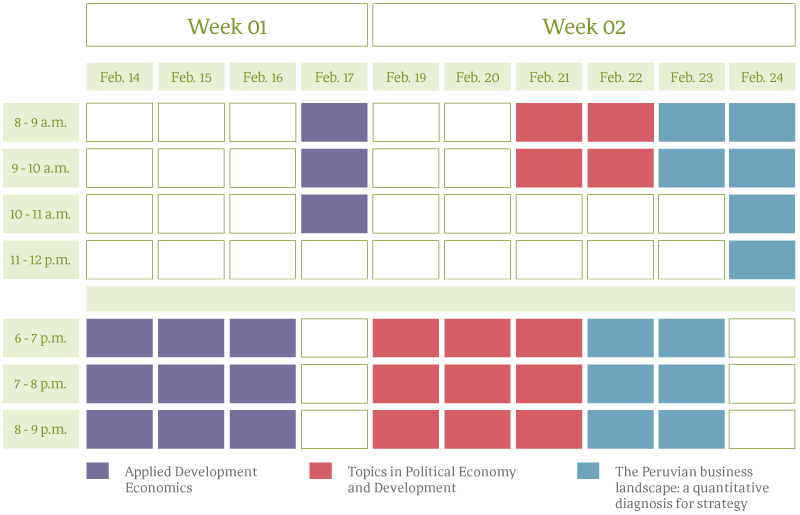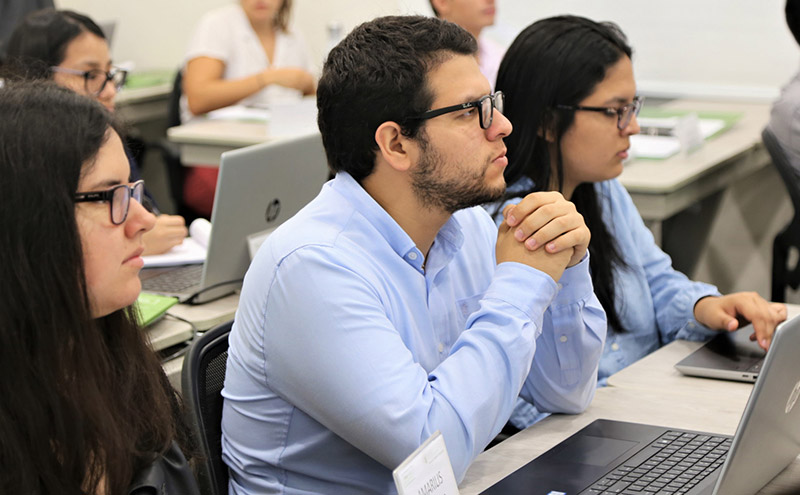February 14st – 17th , 2024
Topics in Applied Development Economics
This course reviews some influential literature in micro-development economics to develop an analytical understanding of the challenges of global poverty and opportunities for research to inform improvements in human welfare. We will cover common empirical methods used in the literature (randomization, differences in differences, other creative uses of data) and spend some time discussing practical impact evaluation implementation tools (survey design, common implementation challenges and solutions, power calculations). Topics covered may include health, education, cash transfers, and private enterprise development. We will discuss policy applications and implementation at scale.
Dr. Jamie McCasland
Dr. McCasland is assistant professor at Vancouver School of Economics, at the University of British Columbia. She obtained her PhD in Economics at the University of California, Berkeley.
Her research explores topics at the intersection of development and labor and has been organized into three groups: Education and Job Training, Underexplored Barriers to Small Firm Growth, and Women and Occupational Choice Constraints. Dr. McCasland research relies heavily on the design and implementation of large-scale field experiments, benefitting from collaboration with government and a close link to economic theory. She is affiliated with the Abdul Latif Jameel Poverty Action Lab (JPAL) and the Center for Effective Global Action (CEGA)
February 19hth – 22th, 2024
Topics in Political Economy and Economic Development
This mini-course will employ both theoretical frameworks and empirical methods to explore the challenges associated with and potential solutions to obstacles in economic development that are intertwined with political factors. Our journey will commence with a historical perspective, delving into the roles of institutions, state capacity, and their influence on economic development. Subsequently, we will engage in a comprehensive discussion of the political economy surrounding public service delivery in developing nations. Moving forward, we will scrutinize shortcomings within the democratic process, encompassing issues such as corruption, clientelism, patronage, and the private appropriation of state resources. To conclude, we will investigate the ways in which democracy can be harnessed to improve development, backed by empirical evidence on various reform initiatives.
Dr. Claudio Ferraz
Dr. Ferraz is Professor of Economics at the Vancouver School of Economics, University of British Columbia. He is also a part-time professor at the Department of Economics of the Pontifícia Universidade Católica do Rio de Janeiro (PUC-Rio). Dr. Ferraz currently serves as Scientific Director of J-PAL Latin America & Caribbean and as co-director of the Political Economy Network of LACEA and RIDGE. He is a Research Associate at the NBER, an honorary member of LACEA, and a fellow of the Econometric Society. Dr. Ferraz currently serves as an Associate Editor of the Journal of Political Economy, the Journal of Development Economics, and the World Bank Economic Review. His academic research focuses on economic development, political economy, and public economics. In particular, Dr. Ferraz studies governance and accountability in developing countries and the consequences for politics and public service delivery.
February 22th to February 24th, 2024
The Peruvian business landscape: a quantitative diagnosis for strategy
According to Mark Garmaise, from UCLA, "data-guided decision making is now the widely acknowledged gold standard for making business choices. Implementing a data-guided approach requires rich information about the available options as well as a suite of technical tools for analysis. Crucially, however, it also requires a deep understanding of the business setting, for without this understanding the analysis will be at best shallow and at worst severely injudicious. In his 2022 book on the Peruvian firm, my esteemed intellectual collaborator and frequent coauthor Gabriel Natividad provides this fundamental context for anyone who wishes to understand the previously opaque nature of Peruvian firms. He has written an essential handbook detailing, across multiple dimensions, how Peruvian companies operate. (...) Effectively all major corporate decisions are covered by this book and the appropriate chapters offer valuable insights on difficult questions. These insights are useful not only to corporate managers themselves but also to investors, consultants and journalists who seek to understand and evaluate firms."
This course will present the key concepts, frameworks, and empirical findings that are relevant to understand the Peruvian business landscape using detailed information on over 8.2 million businesses operating in Peru between 2001 and 2020. The course companion is the book by Gabriel Natividad (in Spanish) recently published by Fondo de Cultura Económica.
Dr. Gabriel Natividad
Dr. Gabriel Natividad is a Professor of Economics at Universidad de Piura (Lima) and a member of the Lima School of Economics. He received his PhD at UCLA. His finance-related research has been published in the Journal of Finance, the Review of Financial Studies, the Journal of Financial Economics, the Journal of Financial and Quantitative Analysis, and the Review of Corporate Finance Studies. His work also spans the fields of industrial economics and strategy, and has been published in the RAND Journal of Economics, the Journal of Industrial Economics, the Journal of Economics & Management Strategy, Management Science, Organization Science, and Strategy Science. Born in Lima in 1977, he studied Economics at Universidad del Pacífico, where he won the Premio Robert Maes in 1995, 1997, 1998, and the Premio Robert Maes Especial in 1999. His book “La empresa en el Perú” has been recently by publsihed Fondo de Cultura Económica.















